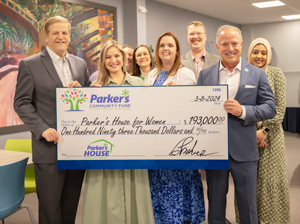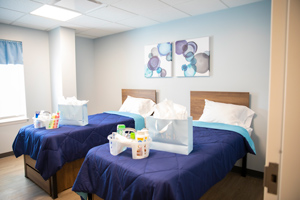Convenience stores are community cornerstones—serving as platforms for charitable fundraising, resource centers and disaster relief hubs when need be. Community efforts often start at the register but go beyond donations—they require a real understanding of local causes, the development of strategic partnerships, time commitments and sweat equity.
In Georgia, Parker’s Kitchen—a food-focused convenience retailer with over 100 locations throughout Georgia and South Carolina—is a powerful engine for community change in its area.
At the heart of the retailer’s efforts is Parker’s House: A Home for Women, the first facility in the region dedicated to supporting unaccompanied homeless women. Opened in partnership with Savannah, Georgia-based nonprofit Union Mission in September 2022, the shelter has already changed the lives of over 675 women.
“The best part about supporting Parker’s House for Women is meeting the residents and seeing the transformative impact that this facility is having on women experiencing homelessness in our community,” said Olivia Parker, outreach and communications manager at Parker’s Kitchen. “To be able to help more than 600 women chart a brighter path for the future is extremely rewarding and fulfilling.”
Parker’s House is just one piece of the broader philanthropic vision realized through the Parker’s Community Fund.
180 Vulnerable Women, One Bold Response
The story of Parker’s House began with a crisis in the communities Parker’s serves—one that Union Mission has been combating for nearly a century. Union Mission started as a soup kitchen in 1937 and grew into a wide-reaching nonprofit offering holistic support, including transitional housing, mental health services, job placement and more with the goal of ending homelessness across southeast Georgia.
Union Mission has provided men with emergency housing since the 1980s. In 2021, the organization identified a gap along the I-95 corridor from Jacksonville, Florida, all the way up to Charleston, South Carolina: no such services existed to protect women, many of whom are survivors of domestic violence or sexual abuse.
“We learned that there were 180 unaccompanied women on the street on any given night in Chatham County, Georgia, where Parker’s is based,” explained Michael Traynor, president and CEO of Union Mission. “So we went to [founder and former CEO of Parker’s Kitchen] Greg Parker and presented him with the plan that we had developed to serve 32 women at a time in the facility with all the wraparound services they might need to get back into housing and to being productive citizens in our community,” Traynor said. “Without hesitation, Greg was all in.”
Putting Community Front and Center
Parker’s Kitchen provided the seed funding for the facility, which now bears the company’s name—Parker’s House. But that initial “all-in” mindset evolved into a long-term, deep-rooted partnership between the two organizations. In July, Parker’s Kitchen donated $1 million to Union Mission to build a new resource center for the homeless in Savannah, Georgia.
“Greg and his team, when they decide to do something, they stay engaged throughout,” Traynor said. “They actually put sweat equity into the organizations they support. And they give their employees an opportunity to be on the ground as well.” Parker’s Kitchen employees volunteer at events, participate in quarterly planning meetings and help deliver critical resources year-round.
Perhaps Greg Parker’s all-encompassing approach to philanthropy today stems from his early days in the business, when donating large sumSors of money was impossible. In 1976 at the age of 21, Parker opened his first convenience store in Midway, Georgia. He cooked in the back, cleaned the pumps and handled the books himself. “I was focused on making payroll, paying my taxes and having general expenditures for maintenance issues,” he said. “So I wasn’t very philanthropic.”
That’s one of the reasons the partnership between Parker’s Kitchen and Union Mission works so well—the leaders of both organizations understand how to make maximum impact from small margins.
“Our job is to identify a gap in services and then provide those to the best of our ability using the tools that are available,” Traynor said. “And we believe strongly that there is no mission without a margin.”
Beyond financials, Parker’s Kitchen has stepped in to help Union Mission when it needed additional resources, “or additional minds to help solve a problem,” Traynor said. “It’s very beneficial because nonprofits work on a slim margin and having that ability to support our operations and do the things we need to do enables us to get better outcomes for our local communities.”
.jpg) Parker’s Kitchen provided seed funding to open Parker’s House: A Home for Women and has continued to make donations to the center, as well as Union Mission, over the last several years.
Parker’s Kitchen provided seed funding to open Parker’s House: A Home for Women and has continued to make donations to the center, as well as Union Mission, over the last several years.
A Philanthropic Legacy for Purpose-Driven Retailers
Parker has been extremely successful in the convenience retail business. Having landed on the Inc. 5000 list for fastest-growing private companies seven times while doubling the chain’s locations and growing to 1,800 employees is a feat for any family-owned retailer. Now that Parker is in the “harvest phase” of his career, he’s able to resow the seeds of his success. “The more successful you become, the more you can give back. The more you can give back, the more people want to shop with you and work for you,” he said.
Parker’s Community Fund, which was started in 2020 by Greg and the Parker family, has already distributed over $30 million to hospitals, food banks, schools, veterans’ organizations and more.
As Parker continues transitioning into retirement, his philanthropy remains stronger than ever. “It’s in the DNA of our company. My goal is to grow the Parker’s Community Fund to $100 million and to continue to give back for the rest of my life.”
That might seem ambitious in an industry with tight margins, but Parker believes convenience stores are uniquely positioned to lead in their communities.
“What sets our industry apart is the fact that everyone shops at a convenience store,” Parker explained. “At Parker’s Kitchen, we seek out charitable causes that are universal, just like our customer base.”
Parker understands that not every c-store operator has a multimillion-dollar fund at their disposal. But he encourages his industry peers to start where they are. “There are many different ways to give back. You can be generous with your time and your commitment to a particular cause. You can serve on boards or volunteer at the local food bank,” he said.
Frequent transactions also uniquely position c-stores for round-up campaigns, Parker continued. “With over 1 million transactions per week at Parker’s Kitchen, something as simple as a round-up campaign can be an incredible opportunity to make a tremendous impact on an ongoing basis.”
The success of Parker’s House is owed in part to c-store consumers. “Every year, for three to four months, customers can round up in the store to the nearest dollar just by pressing a button on the screen, saying that they want to provide for unaccompanied homeless women in our community,” Traynor said. “And then Parker’s Community Fund makes a contribution at the end of that drive based on the amount of dollars that are raised.”
Its most recent round-up campaign for the Wounded Warrior Project raised $360,000. Parker’s matched 25% of customer donations.
“At Parker’s Kitchen, we’ve quite literally made giving back to the community part of our core values as a company,” Parker said. “And it should be that way for every business, because it cultivates loyalty, supports revenue growth and enhances recruitment efforts.”
“I think it’s important that any company or organization builds brand loyalty,” Traynor said. “At the end of the day, it’s not about these contributions directly growing sales,” he continued, “but it’s a critical tool in the toolbox, because I do believe people want to support businesses that support the things they believe in.”
 With 16 double-occupancy bedrooms, Parker’s House can house 32 women at a time per night.
With 16 double-occupancy bedrooms, Parker’s House can house 32 women at a time per night.
Local Cause, Loyal Customers
For both Parker’s Kitchen and Union Mission, the emphasis on local is critical. They believe that customers are far more likely to engage when the impact of their donation is visible in their own backyard.
“My best advice is to think local,” Parker said. “Focus on local nonprofits and causes that resonate with your customers.”
Take Parker’s House, for example, where customers can contribute toward helping the homeless population in their own community. Or the Wounded Warrior Project. “We have so many active-duty military and veterans in our area, so it really resonated with our customers,” Parker said. “When you give back to local organizations and they’re spending money where the customers live, customers are more apt to give.”
Parker said to keep in mind that whether it’s customers choosing to contribute or c-store leaders considering charitable contributions, giving back is always a personal decision.
Parker’s advice is to get personal: It starts with causes that you as an individual, and each individual that walks through your doors, are passionate about. “If you’re just getting started in your career, I understand that there’s only so much you can do. When the time comes, give what you can to the causes that matter most to you and your customers. The more your customers and your team members understand what you’re trying to accomplish, the more they’ll be willing to support your efforts and to amplify the impact of your philanthropy.”
Parker’s Kitchen’s legacy is something far more lasting than its successful convenience business: It’s the lives it’s helping to rebuild, the communities it’s helping to strengthen and the example it’s setting for an industry that has the reach to give back.